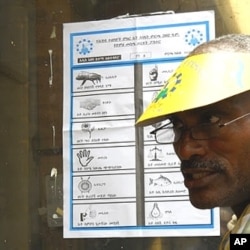Ethiopians are voting in the first national election since 2005, when almost 200 people were killed in post-election violence. Voter turnout appears high despite opposition allegations of fraud and intimidation.
This man, wearing a paper yellow visor, points a stick at a ballot, blown up so a small group of voters can see it, while he issues instructions. He tells voters to mark symbols like a bee for the ruling party, and a "thumbs up" for one of the leading opposition parties before putting their ballots in the box.
The election for Ethiopia's 547 national parliament seats will determine which party gets to form a government and select the head of state. Nearly everyone believes that the country's ruling party, the Ethiopian People's Revolutionary Democratic Front, will have another landslide victory.
The governing EPRDF, lead by Prime Minister Meles Zenawi, has ruled Ethiopia since ousting the former regime in 1991. Since then, the EPRDF has dominated three elections.
In 2005, after allegations that the ruling party had stolen the elections, almost 200 protesters were killed, and more than 100 opposition leaders, activists and journalists were arrested by the government. Two years later, almost all of the detainees were pardoned.
Today, 180 European Union observers and 60 from the African Union are visiting poling stations across the nation. Chief Observer Thijs Berman says it is too early to say if emerging reports of voter intimidation are accurate.
"There are, just like in the campaign period allegations, of course, but I do not know to which extent and how serious they are," Berman said. "I have no idea."
But opposition leader Hailu Shawel, who heads the All Ethiopian Unity Organization, calls the election "ridiculous." He accuses the ruling party of intimidating voters, scaring away election observers and preparing pre-marked ballots.
"They want to be there forever," Hailu said. "Why they held an election is what surprised me. I thought they wanted to make amends for the past. They want to do something more sensible, but they just want power, that is it - at any cost."
Outside the polls, voters, even those that openly support opposition parties, seemed more confident in the election process. Many say they believe their ballots are confidential, and that their votes will be counted. Others say the ruling party is in power because it is popular, not because it rigs elections.
Last night in the bustling Haya Hulet market, Zoudit Tesfae waited for her jacket to be tailored, and said she was planning to vote for the ruling party because she prefers stability to change.
Zoutit says before the EPRDF took over the country, Ethiopia was a dictatorship, and her parents had to hide her sons, lest they be forced to fight in one of many wars. She did not object to the other parties running in today's election, but said Ethiopia had developed a lot in the past 19 years, and she does not want a new government to have to "start from scratch."








